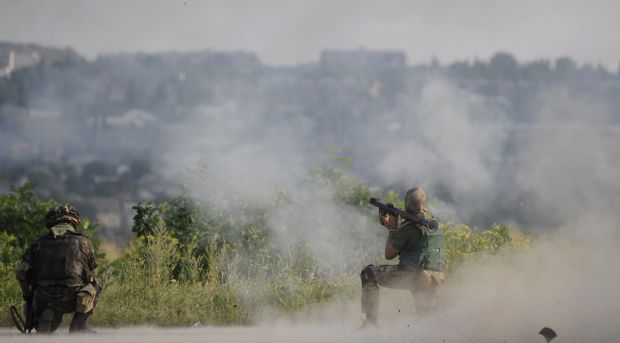
Aborted Offensive in Donbas on Eve of G7 Summit
Publication: Eurasia Daily Monitor Volume: 12 Issue: 106
By:

It was hardly surprising that the fragile ceasefire in eastern Ukraine was broken last week by an exchange of artillery and tank fire after weeks of deployment of Russian troops and heavy weapons in the war zone. What was unexpected, however, was the direction of the Moscow-backed rebel attack on Maryinka to the west of Donetsk and the rebels’ readiness to fall back after meeting stiff resistance from Ukrainian forces (Polit.ru, June 4). It was not possible to hide the fact that the separatists initiated this surge in hostilities, but the war managers in Moscow showed they could terminate the escalation. Therefore, President Vladimir Putin’s statement on continuing the ceasefire, which was released last Saturday, reflected the reality on the battlefield, even if it had been recorded a few days prior (RIA Novosti, June 6). In trying to control the clashes while maintaining a denial of responsibility, Putin seeks to show both resolve and flexibility in order to counter the perceived increase in the threat on Russia’s western flank.
Moscow is quite nervous about the “secret conference” that the United States’ Secretary of Defense Ashton Carter held in Germany in order to discuss the insufficient effectiveness of sanctions and possible further measures in response to probable further moves by Russia (Rbc.ru, June 4). The Kremlin indicated it was concerned about the media reports of US plans to deploy missiles in Europe if multiple Russian violations trigger the breakdown of the Intermediate-Range Nuclear Forces (INF) Treaty (1988) (Kommersant, June 5). Even greater resonance was generated by the report “The Russian Challenge,” produced by the Royal Institute of International Affairs (Chatham House), generally not known for radicalism in its assessments (Nezavisimaya Gazeta, June 5). The Chatham House report’s sober conclusion that the West must prepare for a long-term confrontation with a weakening but dangerous Russia was condemned by the State Duma. Russian deputies charged that the report served to justify the North Atlantic Treaty Organization’s (NATO) purported master plan to subjugate Moscow (Newsru.com, June 4).
Yet, the main focus of Putin’s anxieties is, arguably, the G7 summit on June 7–8, in Schloss Elmau, Germany (Kommersant, June 6). The Russian president’s Crimean gamble was based on the premise that US leadership had slackened and NATO unity had eroded, but the G7 leaders have established—without promising miracles or cracking down on protesters—that the Western pillar of world order remains solid (Gazeta.ru, June 4). The spasm of hostilities in Ukraine’s eastern region of Donbas received due attention but did not distract the summit participants from discussing such matters—entirely irrelevant from Putin’s point of view—as empowering women (Rbc.ru, June 5). Nobody in this time-tested institution has any interest in entrenching the West’s confrontation with Russia. But with ever-growing acknowledgement of the pre-determined failure of the Minsk agreements, the G7 increasingly understands that high-precision sanctions on Russia will need to be combined with military containment.
Moscow has good reasons to worry about these sanctions, and Prime Minister Dmitri Medvedev has already issued a warning about a “symmetric response” to any new punitive measures from the European Union (Forbes.ru, June 2). Russian consumers will be harmed by such “counter-sanctions” much more than European businesses. But the plain fact is that Russian political ambitions undercut every professional effort to steer the economy through the crisis, which refuses to follow orders from the Kremlin and keeps breaking through false bottoms (Rbc.ru, June 3). Some had hoped that the last meeting of the Organization of the Petroleum Exporting Countries (OPEC) would decide to prop up the oil price, allowing Russia—which has desperately expanded domestic production—to continue to benefit from free riding (Nezavisimaya Gazeta, June 3). Predictably, no good news on OPEC quotas came from Vienna last week, so the ruble has resumed its inevitable downward slide (Gazeta.ru, June 5). This economic feebleness reduces Putin’s power politics to high-risk military bluffs and extra-high-volume propaganda campaigns, which can paper over Russians’ falling incomes for only so long.
Another topic on the G7 agenda, emphasized particularly by the re-energized British Prime Minister David Cameron, is the global struggle against corruption. And Russia has every reason to worry about being on the receiving end of this “zero tolerance” policy. These worries were accentuated in the last couple of weeks by the devastating scandal in the Federation of Association Football (FIFA), which Russian mainstream media tends to present as a plot aimed at denying Russia the privilege of hosting the 2018 World Cup (Slon.ru, June 3). Many government officials know, however, that the investigation will likely uncover plenty of dirty deals and financial flows leading directly to the Kremlin (Forbes.ru, June 3). This helps the EU to erect new barriers against the export of Russian corruption to Europe. For instance, Deutsche Bank has expanded its internal investigation of alleged Russian money laundering to the impressive sum of $6 billion (Newsru.com, June 5). A new set of US and EU sanctions specifically targeting the flows of Russian “dirty money” would reinforce the brave effort of anti-corruption blogger and opposition leader Alexei Navalny, who keeps uncovering spectacular cases of fraud and embezzlement—for example the failed project to create an international financial center in Moscow (Navalny.com, June 4).
The swiftly terminated rebel attack on Maryinka was probably meant to be Putin’s “warning shot” to the Western leaders. But he only succeeded in reminding them about the near certainty (rather than risk) of a summer spasm in the “hybrid war.” While the Russian battalions concentrated in the war zone appear far from eager to go into battle, the assorted war-bands of local thugs and Russian “volunteers” of invariably aggressive persuasions have nothing else to do but to resume fighting. It seems Putin’s support base is eager to cheer for new victories but absolutely not ready to keep waiting for them while experiencing Russian-style austerity, even if it is explained away as caused by the economic “aggression” of the hostile West. Every picture from the top-level schmoozing in the Bavarian Alps presumably reminds Putin that there is no way back for him, and every opinion poll tells him that the time for the next strike is now, before his loyal subjects tire of the chronic deadlock. There is really no point in waiting for the European Council meeting in late June, where the sanctions are certain to be prolonged; but it is quite tempting for Moscow to try to reshape its agenda.




